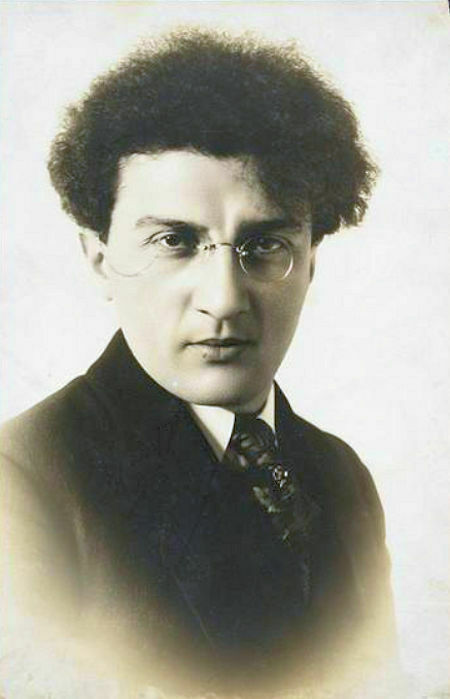
Samuel Goldenberg
Samuel Goldenberg, who was born in Brest, Lithuania, worked as a tailor before becoming a leading Yiddish-language actor-singer-pianist. He was known to incorporate piano solos into dramatic scenes, such as the gimmick of hiding a piano behind tombstone props to raise music from the dead.
Some of Goldenberg's performances included the title role in the Yiddish Art Theatre's “Jew Suss” in 1929, “Svengali" in “Trilby,” and “Dr. Jekyll and Mr. Hyde.”
As to Samuel Goldenberg’s early career, after his family had moved to Warsaw, Poland, a Yiddish troupe arrived, and Goldenberg was given a role in the play, “The Robbers,” by Friedrich Schiller. Soon thereafter, he began to play in father roles.
He then travelled to London to avoid the draft, but he was not permitted to join the professional theatre then. He founded a worker’s dramatic group, while he earned some money giving piano lessons. Soon he met the actor Sigmund Feinman, who gave him an important role in the Osip Dymov play, “Hear, O Israel.”
He then began to play romantic leads.
He played for one-and-a-half years in South Africa, then he returned to play in London and Paris, and then he traveled to Argentina and acted there.
In 1917 he was brought over to America by Boris Thomashefsky and played in New York City’s National Theatre, where he played for two seasons, then he crossed over to the Second Avenue Theatre. Goldenberg played in a good number of Yiddish theatres in his successful career, not only in New York City, but elsewhere in North America and abroad.
He also worked as an actor in Maurice Schwartz’s Yiddish Art Theatre from the late 1920s to the early 1940s.
He played in the American Theatre too, in several English-language Broadway productions, such as “American Dream,” “The Eternal Road,” -- a musical with music by Kurt Weill, and for a time in the short-lived production of Chekhov’s “The Cherry Orchard.”
Goldenberg also starred in a Yiddish-language film, “Song of Songs” in 1935, in a role he also played in the original stage version.
Goldenberg had been cast as Leon Trotsky in the 1943 film, “Mission to Moscow,” but his scenes were edited out in the final release. Incidentally, Goldenberg had previously played Trotsky in a drama about the Russian Revolution twenty years earlier.
In a 1918 article in “Der tog,” a Yiddish-language newspaper, Alter Epstein, under the nom de plume of Uriel Mazik, wrote the following about his acting on the Yiddish stage:
"It hasn’t been long since Mr. Goldenberg first appeared to the Yiddish public here in America, and one can say nowadays that he is one of the most well-known of those beloved actors that are on our stage. The productions in which he appears are always very well attended, and he has pleased his audiences a great deal. They always welcome him with their storm of applause, which is voiced only for stars, for great artists, for the chosen. Often the applause even turns into ovations, in a storm of enthusiasm, which doesn’t happen very often, even with a star. In a word: He is now easily the most easily luminous star on our stage.
It's amazing how the general public chooses its favorite. In this time when there are many actors with talent, truly gifted, who remain in the darkness throughout the year, who need to make the greatest effort in order to be seen and remembered; in the time when many artists survive one disappointment after another, someone comes along, almost a stranger, and with one stroke he tears down all the laurel wreaths; without the least bit of labor and hardship and becomes the most recognized actor ...
If one can say such a thing, Mr. Goldenberg is someone who understands that this is the way to play theatre. He is a virtuoso in creating various effects. He is a master of necessary inspiration. And one must give him the recognition that he can create the illusion of truth in this way. And this cannot be done without talent. One must have a certain strength to do all these things, just as one must be able to create a shund novel.
We remember quite well the impression that Mr. Goldenberg made on the audience with his acting as the "Moneylender" in, “Love and Usury,” and we remember quite well his performance in his role in, “Song of Songs,” and in, “For Our Children." We remember the enthusiasm and the applause; the loud cry of the crowd still rings in our ears. No other performer, not even a tenth, was applauded as much as him. Everyone else was forgotten. There was only one Goldenberg above everyone and everything."
Here is a song, "Once Upon a Tish'ah Bov," from the play, "Stepchild of the World," as sung by Samuel Goldenberg, with an introduction by the fine Yiddish actress, Miriam Kressyn.
-
Across the Valley
-
Twin Sister Radiance
-
Napa Seasons
-
Big Sur Coast
-
Summer Splendor
-
Tête à Tête
-
Beyond the Vines
-
Summer Fog
-
Into the Light
-
Elkhorn Peak
-
Colorado Color
-
Alley House
-
Down Plumtraw Road
-
Aspen Stand
-
Cut Throat Trout
-
Lake Tahoe Luster
-
Yellowstone Cutthroat
-
Sanderson Barn
-
Napa Valley Patchwork
-
Autumn Glow
-
Blurring the Vines
-
Down Williams Road
-
Party Vines
-
Boy Who Would be Chief